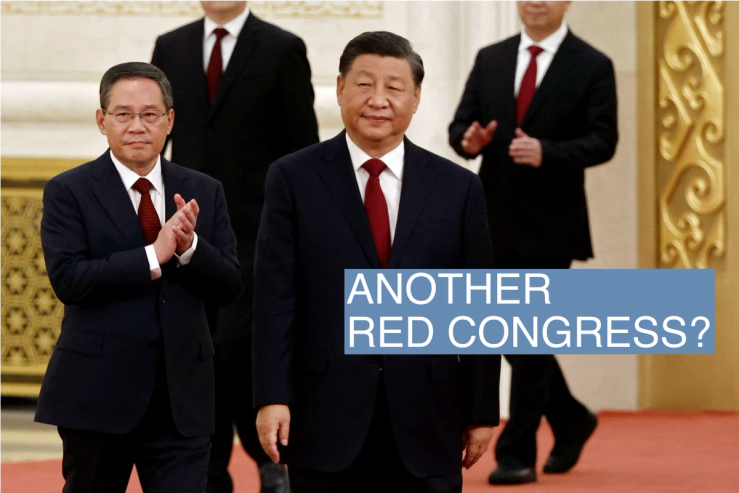The News

House Republicans are plotting an expansive anti-China agenda if they take power next year, one that could push the U.S. toward a more confrontational relationship with its chief global rival.
The Republican agenda, according to eight people with knowledge of the plans, includes at least a dozen China-related efforts — everything from probing the origins of the coronavirus and Hunter Biden’s business dealings to tightening oversight of little-known agencies that determine trade restrictions.
The new majority’s planned targets would cross multiple committees and include:
- The COVID-19 outbreak
- Export controls targeting industries in China
- Foreign investment by U.S. companies in China
- Global Chinese language and cultural programs known as Confucius institutes
- Changes to the Committee on Foreign Investment in the United States (CFIUS)
- Intellectual property theft by China
- Reshoring supply chains
- U.S. policy on Taiwan
- Human rights in China
- China state-owned companies’ purchase of U.S. farmland
- The space race
“There’s a lot of members of Congress on the Republican side that are extremely interested in this,” said Erin Walsh, a former Trump National Security Council official now at the Heritage Foundation.
Front and center in House efforts would be a new select committee on China that House Minority Leader Kevin McCarthy wants to set up. The plans for the panel are being closely held, but some members see it as a continuation of the China Task Force convened by McCarthy in 2020 that would help coordinate China policy across different committees.
“I think what we’ll be able to do that’s different is hold hearings and really dig into these issues,” Rep. Michael Waltz, R-Fla., a member of the original task force, said in an interview.
Rep. James Comer, R-Ky., told Semafor he would investigate Hunter Biden’s reported business dealings in China through his perch on the House Oversight Committee but would not be part of the select committee – suggesting the Biden probe would be a separate track.
Republican members Jim Banks of Indiana and Michael McCaul of Texas are among the caucus’s lead voices on China issues.
Banks, who chairs the Republican Study Committee and is a contender for House majority whip if Republicans win back control of the House, told Semafor his top choice to serve on the select committee would be Rep. Mike Gallagher, R-Wis., a member of the House Armed Services Committee who has argued for boosting Taiwan’s defenses.
“Preventing World War III is the mission, or at least it’s my mission,” Gallagher said in an interview. “If McCarthy were to ask me to serve on it I would jump at the opportunity and pour as much energy into it as I have.”
McCaul, the top Republican on the House Foreign Affairs Committee, has called for a 90-day review of Commerce’s Bureau of Industry and Security which oversees export controls on technology sent to China and other countries. His committee also oversees security assistance to Taiwan.
Reps. Mike Rogers, R-Ala., and Mike Turner, R-Ohio — the top Republicans on the House Armed Services and Intelligence Committees, respectively — will also play significant roles shaping the approach to China.
Republicans are expected to push for an overhaul of U.S. policy on Taiwan, and introduced legislation this year calling for “strategic clarity” when it comes to defending the self-governing island against a possible Chinese invasion. Waltz, who recently returned from a trip to Taiwan, and Gallagher both said Republicans will aim to speed arms to Taiwan.
Rogers said he wants to eliminate China from the defense supply chain and work to replenish U.S. weapons stockpiles so they are sufficient to both send defensive aid to Taiwan and maintain readiness.
“If Republicans take control of the House next year, the House Armed Services Committee will remain laser focused on deterring China and protecting our nation,” Rogers said in a statement.
In this article:
Morgan’s view
It’s winning politics to be seen as tough on China. Negative views of China in the U.S. have steadily grown, with a March Pew Research Center survey showing 82 percent of U.S. adults harbor a negative view of China. Politicians in both parties have run ads featuring tough-on-China rhetoric this cycle. It’s less of a clear partisan split so much as a contest among leaders to appear tougher.
President Biden’s administration has largely continued the policies of the Trump administration on China, though they’ve dropped some over-the-top confrontational rhetoric. On Monday, the Justice Department unveiled charges against 13 Chinese nationals in three separate cases for obstructing the prosecution of Huawei, recruiting spies and trying to force a U.S. resident to return to China.
There’s also a fair amount of compatibility between parties in areas including human rights, support for Taiwan, and economic competition.
China is an area where Republicans and Democrats “don’t have significant differences,” Rep. Young Kim, a California Republican who sits on the House Foreign Affairs Committee and led a bipartisan effort to pressure China over human rights abuses of Uyghurs, said in an interview.
Concern about China’s threats to the U.S. edge in science and technology helped drive the bipartisan CHIPS and Science Act this year. Biden, along with Democrats like West Virginia Sen. Joe Manchin, has also made reshoring and securing supply chains a top focus and his administration recently rolled out export controls targeting China’s chip industry. McCarthy has also said he hopes the select committee on China can be bipartisan.
“I think it would send a strong signal if we can bring the Democrats along and … pass really good, tough bipartisan legislation that goes after the threats posed by the CCP,” Gallagher told Semafor, referring to the Chinese Communist Party.
Perhaps just as appealing for Republicans, though, is that it’s a rare foreign policy issue they can agree on within their caucus. Other foreign policy debates, like assistance to Ukraine, have badly divided members in recent months.
“You’re seeing people on China have a lot more unity than you see on these other issues,” said Hannah Hummelberg, senior director of government affairs at the Vandenberg Coalition and former aide to Senate Minority Leader Mitch McConnell.
So partisan battles are likely to be confined to less actionable issues, including COVID-19’s origins and Hunter Biden’s business dealings.
Room for Disagreement
Some worry a competition between parties to reflexively out-hawk each other on China issues will produce bad policy outcomes.
Matt Duss, an outgoing foreign policy aide to Sen. Bernie Sanders, I.Vt., who starts later this month at the Carnegie Endowment for International Peace, told Semafor that alienating China could hurt efforts to team up on important global issues, like climate change.
“It tends to close off political space for any political cooperation,” Duss said.
Duss also warned that, while the challenges posed by China were real, overheated rhetoric could fuel harassment and racism against Asian Americans.
The View From Beijing
Officially, the Chinese embassy declined to comment on a hypothetical when asked about Republican plans. But there are signs Beijing expects relations with the U.S. to continue down a rocky path after the midterms.
A piece recently published in the state-owned Global Times suggested that Biden would project a tough stance on China as 2024 nears because of the political benefits.
“If Biden wants to get reelected in 2024, he has to show strong leadership in foreign affairs where the U.S. president has stronger power than Congress. And this may bring more uncertainty to China-U.S. relations because Biden could further promote the Indo-Pacific Strategy and strategic competition with China to show his tough stance,” Chinese professor Diao Daming is quoted as saying.
— Kadia Goba contributed reporting.

